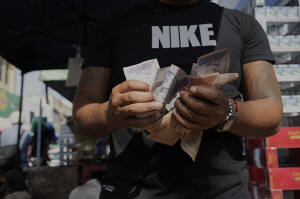Inflation, currency woes worsen Venezuela's complex crisis as Maduro
declares 'economic emergency'
[April 15, 2025] By
REGINA GARCIA CANO
MARACAIBO, Venezuela (AP) — Erick Ojeda has no money. He returned to
land almost empty-handed from an overnight trip fishing for shrimp. His
sister and her newborn are waiting for him to pick them up from a
hospital. He has had no luck finding a ride there, so he is still
helping fishermen get boats out of the water and weigh what little they
caught.
The fishermen are all struggling, like most everyone in Venezuela, whose
protracted crisis continues to evolve, entering a critical phase in
recent weeks by further gutting people’s purchasing power and laying the
groundwork for a recession. This latest chapter in the 12-year crisis
even prompted President Nicolás Maduro to declare an “economic
emergency" last week.
Tired, hungry and worried, the fishermen don't complain and keep to
their tasks, or nap, under a hut with a view of an oil tanker on Lake
Maracaibo. They know they are lucky to have a source of income,
unreliable as it is, in 2025.
“I have to keep toiling away even if work is bad,” Ojeda, 24, said. “ We
keep going trusting God. Let’s see if God works miracles to fix all of
Venezuela.”
The country’s economy is unraveling yet again as key oil revenue dries
up due to renewed economic sanctions punishing Maduro for electoral
fraud and as his government finds itself with little wiggle room to
respond despite some post-pandemic stability.

Economic renaissance
Venezuelans emerged from the pandemic to fully stocked grocery stores
and the U.S. dollar as the dominant currency for everyday transactions.
They left behind years of bartering, lining up for hours outside
supermarkets or even fighting on the streets for flour, rice, bread or
other food items. They also stopped carrying bricks of worthless bolivar
bills to pay for necessities.
Those changes were the result of government decisions that eased price
controls on basic goods and allowed consumers and businesses to use
greenbacks without restrictions. They also occurred because the
government used the Venezuelan Central Bank to inject millions of
dollars into the foreign currency exchange market every week and prop up
the bolivar.
Those government measures helped end a yearslong cycle of
hyperinflation, which had reached 130,000% in 2018. Gross domestic
product grew 8% in 2022, according to the International Monetary Fund,
after the economy shrank about 80% between 2014 and 2020.
Maduro and his government began touting an economic renaissance of
sorts. In the capital, Caracas, imported goods stores, restaurants,
department stores and other businesses began to pop-up seemingly
overnight. The use of ride-hailing and food-delivery apps proliferated.
Some families in poor neighborhoods ventured into business ownership
operating hot dog carts and other food stands.
But the growth mostly concentrated in Caracas, and communities across
the country, including Maracaibo, which prides itself in being the heart
of the oil industry, did not see major gains.
“If you pay more attention to those main avenues… you’ll see that most
of the businesses are closed,” Luis Medina, 21, said pointing to an
avenue in downtown Maracaibo. “There’s a Subway that’s closed, for
example, and next to it is a Movistar (cellphone store), which is also
closed. Next to it is an international restaurant, El Gaucho, originally
from Argentina, which is closed, too."

US dollar as safe haven
Like people in other Latin American countries – and long before their
nation came undone in 2013 – Venezuelans have used the U.S. dollar as a
safe haven asset and see the exchange rate as a measure of the economy’s
health.
Maduro’s government began using cash reserves in 2021 to artificially
lower the exchange rate, making people at one point pay 3.50 bolivars
for $1. That led to roughly 67% of retail transactions being made in
foreign currency.
The rate grew slowly, and by 2023, Maduro’s efforts to inject dollars
into the economy were aided by energy giant Chevron, which started
regularly selling millions to banks to get bolivars to pay bills after
the U.S. government let it to restart operations in Venezuela. The
infusion of dollars allowed the government to maintain the rate around
35 bolivars to $1 through mid-2024, when the warnings of economists
materialized.
[to top of second column] |

A man counts Venezuelan Bolivars at a street market in Caracas,
Venezuela, Friday, April 11, 2025. (AP Photo/Ariana Cubillos)
 “So many of us said that … sooner or
later, it was going to be unsustainable,” economics professor
Leonardo Vera said. “It was already evident in July that there were
shortages of foreign currency in the official market in the face of
growing demand, and those who couldn’t get foreign currency began to
move to the black market, a very small market where when a surge in
demand arrives… the price goes up.”
This month, the official rate reached 70 bolivars to $1, but the
black market hit 100 bolivars to $1 last month.
Vera explained that factors influencing the price include Maduro’s
reelection claim, the results of the U.S. election and the decision
of the Trump administration to revoke Chevron’s permit to pump and
export Venezuelan oil.
The Biden administration granted Chevron’s permit in late 2022 after
Maduro agreed to work with Venezuela’s political opposition toward a
democratic election. But the election, which took place in July
2024, was neither fair nor free, and Maduro was sworn in in January
for a third six-year term despite credible evidence that his
opponent got more votes.
‘Economic emergency’
Before the official and black market rates grew apart considerably,
formal and informal businesses applied the government’s rate for
transactions. These days, however, informal businesses, such as the
food markets where the majority of Venezuelans buy groceries, favor
the black market’s rate, making some goods unaffordable.
Prices have also increased at formal businesses, including grocery
and hardware stores, because companies are setting them based on the
expected higher cost to replenish their inventories.
Economist Pedro Palma said Venezuela's inflation rate could be
between 180% and 200%. He warned that people will cut spending
because salaries will not keep up with inflation and some could even
lose their jobs.

“We have a truly dramatic outlook: on the one hand, skyrocketing
inflation; on the other, the prospect of a very significant
recession," Palma said.
Maduro last week sent a decree to the ruling-party controlled
National Assembly seeking powers to enact emergency measures to
“defend the national economy,” including suspending tax collections
and establishing “mechanisms and percentages for mandatory purchases
of national production to promote import substitution.”
He attributed the decision mostly to the impact of the U.S. tariffs
on the global economy, but Venezuela’s latest economic troubles
predated Trump’s announcement. Weeks earlier, he also announced the
shortening of state employees' workweek, effectively giving them
ample time to pick up second jobs to complement their approximately
$1.65 monthly minimum wage and $100 monthly stipends.
But companies generally are not hiring, and some businesses are now
paying employees in bolivars instead of dollars, which has increased
the demand for greenbacks in the black market as exchange houses
limit the sums available to the public.
The latest economic developments were the greatest fears of many
Venezuelans ahead of last year’s presidential election. So much so
that a nationwide poll conducted before the election showed that
roughly a fourth of people were thinking about migrating, primarily
for economic reasons.
Nowadays, though, people largely appear to have abandoned that idea
partly because of Trump’s crackdown on illegal immigration.
Taxi driver Jonatan Urdaneta has transported migrants from the bus
station in Maracaibo to the nearest border crossing with Colombia
for two years. For about 18 months, he made two roundtrips a day and
so did dozens of other drivers. He can now go a day without a single
trip.
“Honestly, it’s looking very bleak,” Urdaneta, 27, said of his
income prospects, standing next to his 1984 Ford sedan. “Let’s hope
this improves when God allows.”
All contents © copyright 2025 Associated Press. All rights reserved |